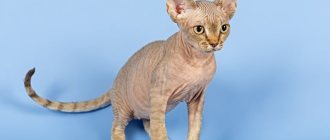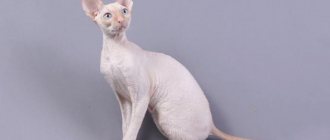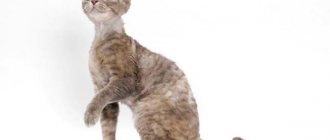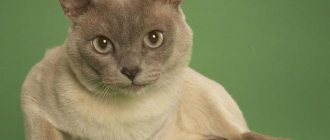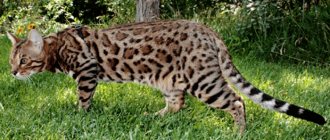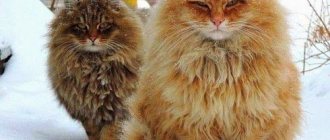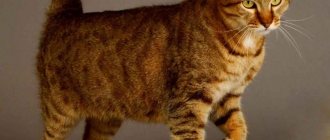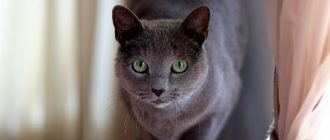Description of the Devon Rex breed
Popularity 50th place among 86 cat breeds
Lifespan:
12-17 years old
Height:
25-35 cm
Country of origin:
Great Britain
Average price:
25-35 thousand rubles
Weight:
2.3-4.5 kg
Latest articles Cat care
How to trim a cat's claws correctly and easily 01/28/2022 139 0 0
Dog health
How to do an ultrasound for dogs: preparation and procedure 01/28/2022 63 0 0
Key facts
Devon Rex is a short-haired cat breed that came to us from England. They have a kind, gentle character and no less attractive appearance. The description of the Devon Rex breed states that the average weight of animals is from 2.5 kg to 4.5 kg. The Devon Rex cat is usually larger and more massive than a cat.
The main characteristic of the Devon Rex is its short, curly fur of various shades. It makes animals hypoallergenic, and most allergy sufferers get this particular breed.
They are often compared to sphinxes and called a “hot” breed. All this is not without reason: although their body temperature is no different from that of other cats, thanks to their special coat, Devon Rex cats seem warmer.
Many owners notice an interesting feature: their pets have strange eating habits. Very often they may develop a craving for some product that is not typical for cats (chocolate, honey, cucumbers, etc.).
The first kitten born with the Devon Rex gene, Curly, died under the wheels of a car. But, fortunately, offspring were already born then, and the Devon Rex did not cease to exist.
The Devon Rex is compared to a dog. All this is not without reason: the breed is very attached to its owner and practically does not leave his side while he is at home. Very often you can see how a pet of this breed approaches its owner and begins to rub its cheek against the owner’s cheek. Well, isn't this wonderful?
The life expectancy of the Devon Rex is enviable: among the representatives of the breed there are often long-livers aged 17-18 years.
Mr. Cat advises: choosing a name for your pet
You need to choose an unusual nickname that reflects the character, behavior, and appearance of the animal.
Suitable names for females:
- Giselle;
- Fly;
- Athena;
- Grace;
- Mystery;
- Dixie.
Interesting nicknames for cats:
- Batman;
- Elf;
- Yakhont;
- Drake;
- Alf.
You can use your imagination and choose a more suitable name for your pet. Only the owner knows the distinctive features of the pet and can, based on them, give a unique nickname. The cat will get used to it quickly.
History of the origin of the Devon Rex
The whole story began in Devon in the 1960s. One day Beryl Cox picked up a cat from the street, which soon gave birth to offspring. Among the kittens, there was one boy with a rather unusual appearance, somewhat similar to the Cornish Rex breed, which was already gaining popularity. He was seen to have curly fur.
The owner thought that this was the same breed and went to the breeder, who also mistook Kirley (the name of that kitten) for the Cornish Rex breed. The head of the nursery decided to start crossing Kirley with her cats, but nothing worked out for her; ordinary kittens were born without signs of a Cornish Rex.
After numerous failed attempts, it was decided that the cat had a completely different gene. Beryl Cox began crossing Kirley first with his mother and then with his sisters.
Unfortunately, Kirley died when he was run over by a car. By that time, the first offspring had already been born, and the Devon Rex lineage was continued.
At first, this breed was jokingly called “elves,” hinting at the mysterious county in which the first kitten appeared.
Until the 1970s, the Devon Rex cat was classified as one breed along with the Cornish Rex, simply divided into two branches. It wasn't until 1979 that the PCA recognized elves as a separate breed.
Breeding rules
When breeding Devon Rex, blood type is taken into account:
- A – dominant, characteristic of all cats of eastern origin (Orientals, Siamese), Maine Coons, Russian Blues and Norwegian Forest cats;
- B – recessive in relation to A, often found in representatives of British breeds;
- AB is rare and poorly studied, close to type A.
40-50% of Devon Rexes are born with type B, and the rest are type A. When crossing AA and BB types, the offspring receives 1 dominant and 1 recessive gene. The first representatives will have type A, acting as carriers of type B. Carriage of type B blood can only appear in subsequent generations.
When crossing BB and BB or BB and AB, the offspring will always be type B.
The danger of incorrect mating is reflected during feeding. If a type B cat is crossed with a type A cat, the resulting kittens will be incompatible with the mother's antibodies. Maternal antibodies do not penetrate the placenta, but are released along with colostrum in the first 16-20 hours and cause the death of the offspring.
To avoid unwanted consequences, it is recommended:
- Go through typing. A special procedure is aimed at determining blood type and preventing unwanted matings. In this case, type B cats or animals with the same combination are used for mating.
- Avoid feeding in the first 20 hours after the kittens are born. Babies can be placed on a type A cat or temporarily switched to artificial feeding.
Please note that when breeding type A animals, there is still a risk of having a type B kitten due to the carriage of a recessive gene in one of the parents. The most optimal and less expensive way is to temporarily refuse breast milk.
What does a Devon Rex look like?
“Elves” have an unusual, attractive and memorable appearance. No matter who looks at them, the image of a Devon Rex will stay in a person’s head for a long time. It should also be noted that their appearance is quite paradoxical. Despite their tiny size, Devon Rex dogs have good strength and a powerful body. From the photo of the Devon Rex it is immediately clear that the breed belongs to the category of exotic.
Muzzle
According to standards, the head of a Devon Rex should resemble the shape of a maple leaf (many people compare it to a heart), be slightly elongated in width, and also have a small shape.
Ears are one of the main distinguishing features of this breed. They are very large, deep-set and elongated. They are often compared to butterflies. There may be tassels at the ends. They are also quite abundantly covered with hair, especially at the base.
Large, round eyes are set wide and slightly oblique. It is thanks to them that Devon Rexes have a little mystery. The color matches the coat color. For example: the Siamese has blue eyes. Eye color is distinguished by its saturation and brightness.
Body type
The “chest” of the Devon Rex is very powerful, which sounds paradoxical if you look at their thin, slender and graceful body. The body of male cats may be larger than that of females. The breed has wide bones and a rounded profile. The body itself is medium in size, even small.
The legs are thin and long, but quite powerful. The limbs are round and small.
The tail is long, elegant and thin, the hair on it is distributed everywhere, but not as densely as on other areas.
Coat and color
The Devon Rex's coat is soft. It appears this way due to the length and thickness of the hair. Thanks to this, it has a slight curl, which is very noticeable when you pet the animal. In general, the hair is distributed throughout the body, but there is slightly less hair on the belly, chest and head. She does not need special care.
The colors of the Devon Rex are not so diverse, but there are still several of them. Here are the most common ones:
- Siamese;
- tabby color;
- cinnamon;
- tortoiseshell.
There are no varieties of Devon Rex; the breed follows a single standard. The only difference is the color of the curly fur.
Distinctive features
Representatives of the breed, due to the special structure of their ears, resemble elves: large, widened at the base, low set - framing the muzzle. Some individuals have hair growing on them in tufts. Sometimes the mustache and eyebrows also curl - this enhances the “alien” appearance.
The prefix “rex” denotes the genetic mutation code responsible for the curly, curly coat. The breed is soft and thin. According to the description, the colors are varied.
The animal grows to medium size. The weight of cats does not exceed two to three kg, and males three to four kg. Externally, representatives of the breed appear fragile and weak. But this is not so: they have a muscular body and strong limbs.
Devon Rex character
The first thing to note about the Devon Rex is its playfulness. Cats of this breed are characterized by mobility, curiosity, and activity throughout their lives. Some may consider this a minus, while others may consider this a plus. In any case, this is very important to consider when purchasing a pet.
This character trait can play a cruel joke on the owner. Due to their curiosity in childhood and adulthood, Devon Rex dogs may show increased attention to wires, furniture, and wallpaper. Teaching your kitten to use a scratching post from childhood will save you from chewed objects. Therefore, it is recommended to pay as much attention as possible to your pet during the first year of life. This way you can achieve good behavior and even teach the cat some commands.
To all this should be added their love for heights, so you should take care in advance of a secluded place for your future pet at a height. From there the pet will be able to watch everything that happens in the house.
“Elves” are very attached to their owner, so before buying you should think about whether you can pay enough attention to the pet or not. This is very important: if you are away from home all the time, this can lead to bad consequences. The animal will begin to behave mischievously and aggressively, and individuals with a softer character may become ill.
It follows from this that the Devon Rex will always be near the owner. The cat will sleep with you, sit, and do chores around the house.
It's worth talking about very much. They can meow, purr and make unusual sounds very often.
Devon Rexes treat other pets very well, but you should not have two animals of this breed. They may not share the owner, which will lead to constant hostility.
“Elves” do not show aggression towards children, nor do they show great interest. They love to communicate with adults and their owner. If you teach your child the rules of handling animals, then nothing bad will happen. The Devon Rex will not mind playing any game with a small family member.
The breed also does not show much interest in strangers. Devons will not hide or act aggressively; rather, they will carefully study a new person.
Reviews
miv
The character is a miracle, about vindictiveness - this is not about the Devons at all. Devons love people madly, love to play pranks, and never remember an insult. It’s impossible to scold Devon, but still, if you have to make a suggestion, in a minute he’ll be back with you like a tail, they’re not touchy. But they like to consider themselves the main ones in the family, with properly built relationships, you are the main ones in the house, everything is wonderful. And about the smell and dirty hands, that’s not true. Unless, of course, you don’t wash the cats at all, this also happens; well, it will probably be unpleasant to pet any breed. Devons do not smell if they are looked after properly. I don’t know a smarter breed or a stickier breed. It’s strange to read this about cats; in the Devons, the cats will love you to the point of obsession at times, constantly asking to be held and climbing on your arms like monkeys in a circus. Lately, some negative reviews have begun to appear about girls, but I believe that it all depends on the conditions in which the kitten grew up, how much time they interacted with him while he was growing up, and how they communicated. The girls will still come, but do you think there would be so many people suffering from devomania if they were so bad in character, vindictive and it would be unpleasant to pet them? As a rule, breeders observe a different picture: where one girl settles, after a while a second one appears, delays this matter, and they take him for his extraordinary character, and of course his incredibly beautiful appearance.
nateana
It’s very strange to read about the unpleasantness of Devons... I, for example, due to my workload, did not suffer from frequent bathing of Devons, but they always told me that they either smell very pleasant (something like perfume, apparently they take on the smells of the house), or, on the contrary, they were surprised that cats don't smell at all. Precisely cats, and not in the absence of smell in the house... Although they often talk about this in surprise... well, I don’t even want to answer about “vindictiveness”... this is not a Devon... P/S/ don’t consider it a pervert, but even if Devons smell, it’s very nice... some kind of buns or something... after sleep... or kittens... In my practice, people’s lives and worldviews changed for the better - Devons are faster than psychotherapists in getting rid of depression...
Egoza
I fell in love with Devons at first in the picture, then I saw them live and fell in love with them! Their character is wonderful! The girls are very affectionate, they always “migrate” behind you (they don’t get under your feet), it’s just which room you’re in and they get along great with all family members and guests. Each cat has its own unique charisma; they have a pleasant and melodious voice. And how smart they are! As for the dirty hands after them, it actually made me laugh! They have fur and need to be bathed from time to time...Have you ever petted a Devon, Selena0810?...It’s like ironing velvet, a broadtail skin...you will never forget a Devon’s skin and never confuse it with anything! You write that this woman’s daughter is a veterinarian, so there is no doubt that the animals received proper care. Care is one thing, but love is another! Do you notice the difference? I agree with Larisa that a lot depends on the conditions in which the animal was kept and raised. Devons love attention and simply need it, they listen well and respond in return. These are cats and dogs... Cats in this breed generally love people so much! They will caress, crawl under your arm and look into your eyes, constantly asking you: “Mom, do you really love me?” And I love you so much!” Each person has his own character, each is individual, but each has his own animal. I used to have British cats, they are beautiful, imposing, not intrusive, beautiful in the interior..)…… but this is not my thing! Now, having girls, I realized what a happiness it is when they are nearby! These are my cats. We live in the same rhythm! Listen to yourself and listen to yourself, go to exhibitions, look, pet... It’s true what they say, every cat has its own person..
Video
Raising a Devon Rex
Devon Rexes have good intelligence, good character and show interest in everything new. All of the above is the key to good training and education of the Devon Rex.
Any pet should be taught certain rules from birth so that no one or nothing gets hurt later. Such rules include toilet training and scratching posts.
If you have the desire, you can easily teach your pet some simple commands using affection and treats.
Characteristic diseases
Among the diseases that occur in Devon Rex, the following can be noted:
- Hypertrophic cardiomyopathy. This is a hereditary heart disease that affects some family lines. It occurs at any age, but is more common in adults.
- Airway obstruction. An insidious disease that can be fatal. Measures are being taken to combat it.
- Hereditary myopathy. This disease leads to muscular dystrophy. Initially, the pathology affects the muscles of the neck, and with age it spreads to other muscles.
- Dislocation of the kneecap. Often found in Devon Rex dogs, the disease is hereditary. May progress to osteoarthritis.
- Dysplasia. Pathology of the hip joint.
Devon Rex Health
Possible diseases
At birth, kittens may be intolerant to their mother's milk, so breeders need to monitor the condition of their babies very closely to immediately prevent deterioration in their health.
Devons also experience muscle weakness during childhood. If there are signs of myopathy (this is the name of this disease), then, unfortunately, this will remain until the end of life. Now, fortunately, such cases are very rare.
List of diseases that can occur in adult animals:
- hypertrophic cardiomyopathy;
- dermatitis;
- joint problems.
It is recommended to visit your veterinarian regularly to identify any emerging disease in the early stages and not risk the health of your Devon Rex.
Reproductive health
The onset of estrus in a Devon female can occur quite early - at 6 months. Further, estrus will be repeated several times a year. If estrus occurs more than 3-4 times a year and there are no plans to breed a girl, it is better to sterilize so as not to exhaust the animal’s body.
Mating is possible in the second or third heat, but the choice of a partner should be approached responsibly. The fact is that cats of this breed have two types of blood: A and B. If you cross two different types, then the kittens may experience a Rh conflict during the feeding period, and they will die. Therefore, before mating, you need to visit the veterinarian in advance and donate blood to determine its type.
Rh conflict is possible even if the mother and father of the offspring have the same blood type - one of them may display a recessive gene that is inherited by one kitten or the entire litter. In this case, the kittens are given to a cat with a suitable blood type or artificially fed during the first days of life.
Breed Features
Devon Rexes are so unique that they are easily distinguished from other curly breeds:
- Devonian species, which is formed from the shape of the body, head, large ears and eyes. The appearance, similar to fairy-tale elves, made the breed unique.
- Dog behavior is another feature of Devon dogs. They are often compared to monkeys or dogs. They are very sociable, active, restless.
- The wavy coat is distributed unevenly over the body. This is the result of a mutation. No other representative of the cat world has such a gene. Devonshires are nicknamed "hot cats". The fact is that due to the characteristics of the coat, body heat is not retained in the undercoat. When you touch the skin, it feels hot and your pet has a fever. That is why Devon Rexes like to bask in the winter near the radiators and wrap themselves warmly under a blanket.
Features of feeding and diet
Devon Rex should be fed only with professional food - you should not buy economy-class food, this will harm the pet. Also, you shouldn’t think about eating “from the table”, since choosing a good diet is quite difficult.
If you still decide to prepare food for your pet yourself, then the diet must include: meat, lean fish, cereals, vegetables, dairy products (with a reduced percentage of fat).
You should remove from the diet: chocolate, fruits, milk, liver, spicy and spicy foods, legumes, potatoes, baked goods.
It is better to give meat and minced meat not boiled, but scalded, in pieces of 100-150 grams. Occasionally it is worth pampering your pet with lightly salted cheese or eggs.
Before creating a diet, you should consult with a veterinarian and, based on your pet’s health, create an individual menu or choose the most suitable food.
Care and maintenance.
Caring for the coat of a Devon Rex is no different from caring for the coat of any other cat. Pets should be combed as needed - mainly during mild shedding.
For any animal in the house you need to have separate bowls. If you feed your cat store-bought food, then you should allocate three bowls: for dry food, for canned food and for water. The depth should be average, since the Devon Rex is small. Bowls should be washed as needed.
A scratching post is a necessary element in the life of any cat. Experienced owners advise purchasing vertical scratching posts “for growth” so as not to change them every few months.
It is not a fact that the pet will sleep in the place allocated to it. You can buy ready-made structures at a pet store, where the sleeping place and scratching post are located on several tiers. There the cat will periodically doze off, but at night it will most likely come to its owner to sleep, and it will be simply impossible to kick it out.
Ear and eye care is carried out infrequently, but regularly (about once a week). You can easily purchase special wipes at a pet store - they are ideal and will not cause inflammation. Do not use alcohol, oils or other products under any circumstances; all this will only harm your pet.
Devons also need to have their claws trimmed. To do this, buy special rounded scissors at a pet store; regular scissors will not work - they peel off the nail plates. You need to cut carefully, not going further than 5-6 millimeters from the tip of the claw. The space under the claws also needs to be cleaned - this is where the Devon Rex accumulates a large amount of dirt and grease. In fact, the process is quite simple; you just need to get used to it from childhood. “Manicure” and cleaning of the claw space should be done once every 10-15 days.
Dental care should not be overlooked - without it, the pet is at risk of developing plaque, caries, etc. Once a week, using a bandage wrapped around your finger or a pet brush with zoopaste, you need to carefully walk over the Devon Rex’s teeth. Instead, you can use special chewing treats designed for cleaning teeth.
If you buy a pet from a good breeder, then by the time of purchase the kitten will already be litter box trained. Of course, in a new home, it will be more difficult for the animal to adapt to a new place to go to the toilet. To do this, the breeder will definitely give you the filler that he used while the pet was with him, and this will make the habituation process easier.
In general, caring for and maintaining a Devon Rex is not considered difficult or troublesome. The main thing is to accustom the kitten to hygiene procedures from an early age.
Buying a kitten
You can buy a kitten from numerous breeders, at the age of 3-4 months. At this time, kittens already have a curl on their fur, a distinctive sign of Devons. The skin ripples, this is normal for this breed.
As for the adaptation period, it proceeds quite quickly and is not problematic. Kittens quickly get accustomed to a new place, begin to play and look at all the nooks and crannies of the room. The animal quickly becomes socially adapted, so it comes into contact with all people and other pets.
It is better not to buy it for a very small child, as the baby can simply torture the animal. It is already playful and curious, but is still ideal for a home with older children.
Kittens quickly adapt to any environment and get along with other animals, including rodents. They do not show aggression or fear towards dogs or house guests. Cats quickly get used to it, explore the house and immediately go into the arms of people. The breed has an unusual color, wide ears and wavy hair. These are the main features of the Devon Rex, which are popular in almost all countries of the world.
Tips for choosing a kitten.
Buying a kitten secondhand means putting yourself at risk, especially if the price is too low. A good cattery should have 7-8 years of experience and a large database of kittens sold. Particular attention should be paid to the price: the lower it is, the less conscientious the breeder was towards his pupils. Often these Devon Rex kittens have diseases that appear at a later age, as well as a poor pedigree.
Next, you need to decide on the class of pet you need. If you want a pet, then a pet class is suitable. If for exhibitions, you need the most expensive show class. And if you want to start breeding this breed, then the choice will fall on the breeding class.
If you have your sights set on a show-class kitten, then you should know a few points in which the animal will not be able to receive a high rating or will be disqualified. Animals with too coarse fur, disproportionate ears and head, or a short tail may receive a low score. Disqualification also awaits pets with a crooked tail, bald spots, strabismus, polydactyly and too long hair.
It is worth noting that when purchasing a pet, no one will guarantee a successful exhibition career. The main thing you need is to pay attention to the condition of the animal, and also ask to see its parents.
Be sure to pay attention to the conditions in which the animals are kept. The area must be clean and tidy. Observe the kitten itself - its behavior can say a lot. Since Devon Rexes are quite active animals, the future pet should not be lethargic and bored. It should not have a painful appearance or external defects.
Once you have decided on a kitten, ask to see the breeder's veterinary passport. The animal must have all vaccinations according to age; it is not necessary to have a brand. If the cattery takes care of its kittens, they will already be litter box and scratching post trained by the time you take them home. The age of purchase of a kitten must be at least 3 months.
Breed standard
Kirley's cat was the only one of his kind, so inbreeding was carried out to preserve the curly gene. To strengthen immunity, overall health, and add colors, Devonshire cats were crossed with other breeds. Such a relationship did not always produce curly-haired kittens. But from the mating of pure Devons and their hybrids, 50% of the litter had curls.
Hybrids were and are sold as gene carriers. With proper breeding, they can produce purebred Devon Rex kittens.
In England, Devons were crossed with Cornish, Burmese, Persian and British. When the Devon Rex cat breed appeared in America, they began to be bred with American and British shorthair cats. "Other" blood is allowed by the GCCF (English feline organization) except for the blood of the sphinx. If there was a Sphynx in the Devon Rex's pedigree, such a cat loses the right to breed. FIFe and WCF do not accept the infusion of other blood.
CFA allows mating of Devon Rex with the following species:
- American Shorthair;
- British Shorthair;
- European shorthair.
TICA allows the above 3 connections with breeds such as:
- Burmese;
- Canadian Sphynx;
- Siamese;
- Bombay.
As a result, the Devon Rex breed was divided into 2 types: American (overwhelmingly with a mixture of American and British Shorthairs) and European (with a mixture of Burmese, Siamese, and Cornish).
Devon Rex breed description:
| Become | American | European |
| Body type | An animal with short legs, neck, tail. Short muzzle. The stop is clearly pronounced. Wide chest. | Long legs, neck and tail. The hind legs are slightly longer than the front ones. The muzzle is elongated. The transition from the forehead to the nose is weakly expressed. |
| Eyes | Oval, set slightly obliquely. Eye color matches coat color. | |
| Ears | Very large, set wide, rounded at the tips, tassels possible. Very wide at the base. | |
| Eyebrows and mustache | Vibrissae have curls. | |
| Head | Massive, short, wedge-shaped. There is a sharp transition from the cheekbones to the pads of the mustache. The chin is well defined. | |
| Color according to standards | Any cat colors. However, Devon cats with color point color should have blue eyes, and Minkies should have green-blue eyes. | |
| Wool | Twisted into curls. Longer coat on sides, thighs, face and back. Soft to the touch. Guard hairs are almost invisible. The wave is more pronounced on the tail and body. | |
How much does a Devon Rex cost?
The average price of a Devon Rex in the Russian Federation is from 25,000 to 35,000 rubles. Firstly, it all depends on the class of the animal being purchased. If you choose a breed class (for breeding), then the price will start from 30,000-35,000 rubles. The price for a show-class kitten starts at least 30 thousand rubles. If you just need a pet, then the price will be about 25,000 rubles, but if the kitten has minor external defects that do not affect its health, then the price will be slightly lower.
All kittens whose cost is significantly less than 20 thousand most likely have health problems or not a very good pedigree.
Do you like the article? 0
Nutrition
When fed with high-quality ready-made food, the cat or cat does not need additives. An exception may be fresh grass.
Mistakes made by cat owners
One of the mistakes cat owners make is combining industrial food and food from the human table. Specially developed dry food for cats (its price is slightly higher) is a balanced diet.
With constant consumption of feed, the digestive system adapts to digest it. To maintain good metabolism in the body and optimal fluid balance, a stable diet is important. The kitten should always have fresh water available to drink.
Important! Caution should be exercised when including milk and fish in the animal's diet.
Milk and fish in the diet - pros and cons
Many kittens love milk. However, with age, the animal’s body processes lactose less well. Therefore, private consumption of milk causes problems with the digestive system.
Despite the fact that cats eat fish with pleasure, such a diet is not beneficial for their body. Tuna and some other types of fish contain a lot of magnesium, which can provoke pathologies in animals. In cats, a fish diet can cause muscle diseases.
Not only the price is noted, but also the good appetite of Devon Rex cats. To prevent obesity, you need to monitor the amount of food consumed. Excessive gluttony of a pet is sometimes explained as an attempt to compensate for insufficient thermal protection.
